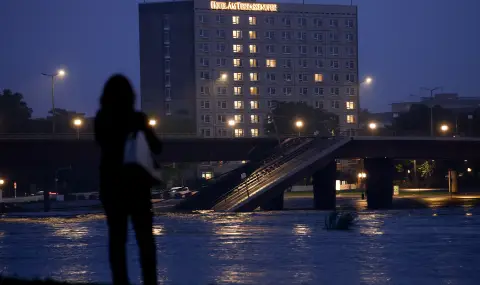When one of the four bridges over the Elbe in the center of Dresden collapsed on the night of September 11, 2024, everyone was shocked. The fact that it escaped without casualties or injuries was bordering on a miracle: almost 800,000 people live in the Saxon capital area, and more than two million tourists visit the city every year. The last night tram had passed over the bridge just 18 minutes before the collapse.
The reason quickly became clear: the steel used to build the bridge between 1967 and 1971 had corroded. Unfortunately, thousands of bridges in Germany are also in poor condition and urgently need to be repaired.
Bridges need at least five billion euros a year
There are around 130,000 bridges in Germany, of which 40,000 are on motorways and main roads and are particularly important for national traffic. According to the Federal Ministry of Transport, around 5,000 of these bridges need urgent repair or must be demolished and rebuilt.
The 2024 budget allocated 4.6 billion euros for the renovation of motorways, main roads and the bridges connected to them. Under the previous government, five billion euros were allocated for this purpose in the 2025 budget, but according to the state-owned company "Automata" This is not enough.
This not only requires repairs to bridges, but also to outdated roads and railways, energy and water supplies, telecommunications, schools, universities and hospitals. Both technical and social infrastructure have been neglected for decades.
In addition, modernization is lagging behind. The conversion and expansion of energy, climate-neutral infrastructure takes time, and the country's digitalization is lagging behind. In a recent survey by the German Chamber of Industry and Commerce (DIHK), more than a quarter of the companies surveyed complained about the lack of fast enough internet.
Repair of 40 important railway sections
Economists have long been urging politicians that more investment is needed. In the summer of 2024, a study by the Institute for German Economics concluded that 600 billion euros would be needed over the next ten years - mainly for the national transport infrastructure.
The plan for the comprehensive renovation of the railway network envisages that the 40 most important sections (a total of around 4,200 kilometers) will be renovated by 2030. However, funding in the amount of 13 billion euros has not yet been secured under this plan.
How expensive a transport infrastructure project can become is illustrated by the infamous "Stuttgart 21" - for the reconstruction of the city's railway junction. Construction work has been ongoing for 15 years, and official cost estimates have risen from an initial four billion euros to eleven billion euros, without this being the final figure.
How will electricity be transported from north to south?
Huge sums will also be needed to further expand renewable energy sources and the electricity grid. Wind power is mainly produced in the north of Germany, and more and more powerful power lines will need to be built to distribute the energy throughout the country. Operators estimate that expanding the electricity grid alone will cost 55 billion euros - in addition to the 110 billion that will be absorbed by expanding local distribution networks by 2033.
So far, the costs have been passed on to consumers and, hence, businesses in the form of network charges. However, this makes them less competitive globally. If the state wants to ease the burden on consumers, it will have to cover part of the network charges. In addition, funds are needed to build backup power plants, energy storage facilities and a hydrogen network.
Housing is scarce and expensive
There is also a significant housing shortage across the country, especially in cities and urban centers, which is why rents have risen dramatically in recent years. In Munich, for example, rents of 24 euros per square meter are no longer unusual when new contracts are signed. This has many negative consequences: people with average incomes are increasingly unable to afford to live in cities, and employers who do not pay high wages can only find workers if they offer company housing.
In its analysis, the Confederation of German Industry estimates that an additional 56 billion euros will need to be invested over the next ten years to stimulate housing construction and to make it possible to build environmentally friendly.
Education and healthcare also need investment
The renovation of kindergartens, schools and universities, as well as the digitalization of all educational institutions, will also cost a lot - between 100 and 130 billion euros. "The German education system is like a large construction site. The tasks are enormous", says the position of the Union for Education and Science. They point out that the shortage of qualified workers, especially in kindergartens and schools, is "dramatic".
Education is the competence of the individual federal states, which means that they bear the main responsibility. However, cities and municipalities also maintain infrastructure that is aging and in urgent need of modernization. Municipalities invest the least because they simply do not have enough funds.
There is an investment backlog of around 50 billion euros in the health sector, and a shortfall of around ten billion euros in civil protection. This includes protection in the event of crises and major disasters such as floods and other weather-related disasters, but also protection against dangers arising from war.
If all these sums were added up, hundreds of billions of euros would actually be needed over the next few years to restore the technical and social infrastructure in Germany to good condition.
Author: Sabine Kinkarz
